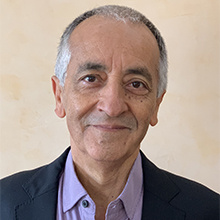
Hernando del Portillo Obando
ICREA Research Professor and Head of the Malaria and Neglected Parasitic Diseases Programme Malària i malalties parasitàries desatesesHernando del Portillo studied molecular aspects of parasites at the University of Georgia, USA, where he received his PhD in 1985, followed by two WHO postdoctoral trainings at the New York University Medical Centre (USA) and the Institut Pasteur (France) where he specialized in molecular biology of malaria parasites. Since then, he has pursued molecular studies in malaria to unveil the mechanisms of virulence and to develop rational control strategies.
He consolidated his independent scientific career as an Assistant/Associate Professor at the Department of Parasitology, University of Sao Paulo, Brazil and as a Visiting Professor at the Centre for Molecular Biology (ZMBH), Heidelberg, Germany.
He joined ISGlobal as an ICREA Research Professor in 2007 and co-ascribed to the Institut Germans Trias i Pujol (IGTP) in 2015. He is presently the Head of the Malaria and Neglected Parasitic Diseases Programme at ISGlobal, President of the Grupo Español de Investigación e Innovación en Vesículas Extracelulares (GEIVEX) and Co-Founder of Innovex Therapeutics SL, the first Spanish company using Extracellular Vesicles as vaccines against infectious diseases.
Línies de recerca
- Molecular bases of the pathology in P. vivax malaria. We have contributed to the identification and characterization of variant genes in P. vivax malaria (del Portillo et al., Nature 2001; Fernandez-Becerra et al., Mol Microbiol 2005; Carlton et al, del Portillo et al., Nature 2008; Fernandez-Becerra et al., Trends Parasitol 2009; Lopez et al., BMC Genomics 2013).
- Cryptic infections and exosomes. Our investigations indicate that cryptic niches outside the liver, in particular in the bone marrow and the spleen, can represent a major source of hypnozoites-unrelated recrudescences. We are presently exploring the role of exosomes as intercellular vehicles between the bone marrow and the spleen and cytoadherence mediated by Vir proteins as the molecular basis of cryptic infections in P. vivax (Siqueira et al., 2012 PLoS Neg Trop Dis.; Brito et al., 2020 J Inf Dis.; Fernandez-Becerra et al., 2020 Proc Nat Acad Sci; Toda et al., 2020 Nat Comm.
- Reticulocyte-derived exosomes (Rex) vaccines against P. vivax. We previously found that exosomes derived from reticulocytes infected with malaria parasites can induce a long-lasting protective immune response. More recently, we determined the proteome of plasma-derived exosomes from P. vivax patients and of human reticulocyte exosomes and showed that they contain MHC class I molecules that are actively uptaken by human dendritic cells. We are pursuing efforts to “tailor” human Rex with P. vivax antigens and determine their potential as a new delivery platform for P. vivax vaccines. (Martin-Jaular et al., 2011 Plos One , Martin-Jaular et al., 2016 Front Cell Dev Biol, Diaz-Varela et al., Sci. Rep 2018).
- Hypnozoite biomarker discovery. The human liver-chimeric FRG-KO-(huHep) mice is a robust P. vivax infection model for exo-erythrocytic development of liver stages, including hypnozoites (latent hepatic stages causing clinical relapses). Since exosomes are recognized for carrying potential biomarkers of disease, we are using mass-spectrometry to identify new markers of asymptomatic hypnozoite carriers and develop microfluidic devices for point of care diagnostics (Gualdron-Lopez et al., Front Microbiol, 2018).
Publicacions principals
- Haruka Toda, Miriam Diaz-Varela, Joan Segui-Barber, et al., Carmen Fernandez-Becerra* and Hernando A del Portillo* (*equal correspondence). Plasma-derived extracellular vesicles from Plasmodium vivax patients signal spleen fibroblasts via NF-kB facilitating parasite cytoadherence. Nat Commun. 2020;11(1):2761. Published 2020 Jun 2. doi:10.1038/s41467-020-16337-y
- Carmen Fernandez-Becerra*, Maria Bernabeu, et al., and Hernando A. del Portillo*. (*equal correspondence). Plasmodium vivaxspleen-dependent genes encode antigens associated with cytoadhesion and clinical protection. Proc Natl Acad Sci U S A. 2020;117(23):13056-13065. doi:10.1073/pnas.1920596117
- Marcelo A.M. Brito, Bàrbara Baro, et al., and Hernando A. del Portillo* and Marcus V.G. Lacerda* (*equal correspondence).Morphological and Transcriptional Changes in Human Bone Marrow During Natural Plasmodium vivax Malaria Infections [published online ahead of print, 2020 Jun 18]. J Infect Dis. 2020;jiaa177. doi:10.1093/infdis/jiaa177
- Marcilla A, Martin-Jaular L, Trelis M, de Menezes-Neto A, Osuna A, Bernal D, Fernandez-Becerra C, Almeida IC, del Portillo HA.Extracellular vesicles in parasitic diseases. J Extracell Vesicles. 2014 Dec 22;3:25040. doi: 10.3402/jev.v3.25040. eCollection 2014.
- Ivo Mueller, Mary R. Galinski, J. Kevin Baird, Jane M. Carlton, Dhanpat K. Kochar, Pedro L. Alonso, and Hernando A. del Portillo. 2009. Key gaps in the knowledge of Plasmodium vivax, a neglected human malaria parasite. Lancet Infectious Diseases, 9(9): 555-566
- Carlton J, et al., del Portillo HA, et al. and Fraser-Liggett CM. 2008. Comparative genomics of the neglected human parasite Plasmodium vivax. Nature, 455: 757-763
- del Portillo HA, Fernandez-Becerra C, Bowman S, Oliver K, Preuss M, Sanchez, C., Schneider N, Villalobos JM, Rajandream M-A, Harris D, L. Pereira da Silva, Barrel B & Lanzer M. 2001. A superfamily of variant genes encoded in the subtelomeric region of Plasmodium vivax.Nature, 410: 839-842.





